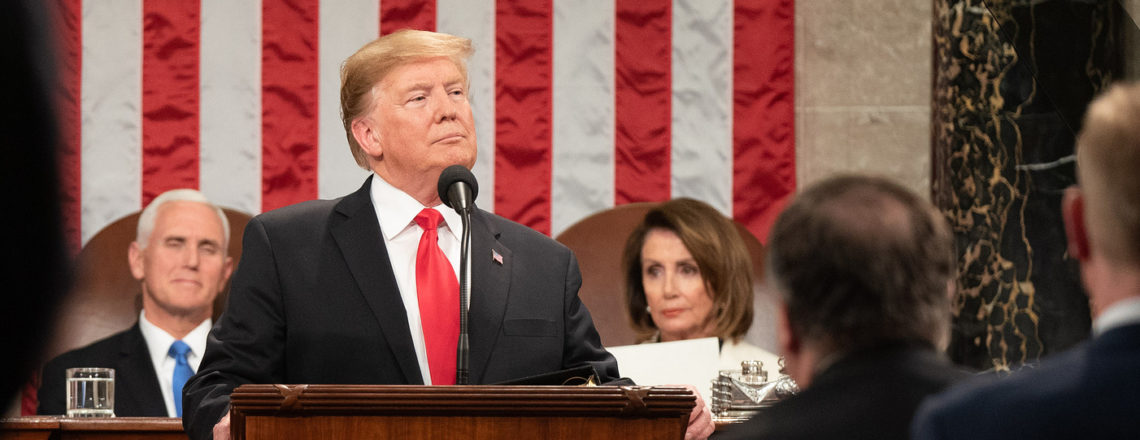
On the night of February 5, U.S. President Donald Trump delivered his second State of the Union address, originally scheduled one week ago and delayed due to the partisan battle over the border issues, leading to the longest government shutdown in history.
The highlights and priorities of Trump’s agenda in the next stage can be discerned in the both conciliatory and combative speech. The first keyword is “unity” since the address is delivered to the whole Congress and Trump would never miss that opportunity to build his image as a president calling for bipartisan cooperation.
Trump thus stated that Americans can bridge old divisions, heal old wounds, build new coalitions, and forge new solutions. Trump not only called for unity in bipartisan terms, but also touched upon the fights against abortion and socialism to unite the divided conservatives in his own party.
On domestic issues, border security was still at the top of Trump’s list when he spent much time to elaborate his stance on immigration, without any willingness to back down on the southern border wall. The possibility of another government shutdown because of the partisan fights over the border issues still looms large.
Although Republicans and Democrats might reach consensus on the funding, recent talks between the two parties collapsed due to their differences over limiting the number of unauthorized immigrants who can be detained by the U.S. Immigration and Customs Enforcement agency.
It seems that the main issue for the two parties on funding the wall or capping the detention is the number, but the real fight is over ideals and politics. Most Democrats still recognize the importance of immigrants to U.S. economic development. They certainly fret about the problems caused by those undocumented immigrants, but they can’t embrace Trump’s aggressive immigration tactics and agenda, especially after Trump once started separating immigrant families.
For those Republicans supporting Trump, they deem those undocumented immigrants as great dangers to U.S. national security and people’s lifestyle. They firmly believe that if the government takes no quick and harsh actions, the situation will be out of control. That’s the reason why the approval rating on Trump’s immigration policies, according to Gallup, was at 40% from February 2017 to November 2018, nearly identical to his overall approval rating.
Politically speaking, the bipartisanship has long been poisoned by the “vetocracy”, a phrase coined by the U.S. scholar Francis Fukuyama, meaning “rule by veto” because the American “separation of powers” has always given a slew of veto rights to many parts of the political system which ultimately makes it ineffective.
As for immigration policies, the two parties sometimes abuse their veto power to prevent the other side to achieve its own political agenda rather than seeking cooperation for the sake of common interest. Furthermore, apart from the Russia investigations, the immigration issue has become another weapon for a racially and gender-diverse House of Representatives to attack Trump after the mid-term elections.
Not devoting too many portions to foreign policy, Trump stressed his achievements and agenda. On the DPRK, Trump announced the date for the second summit between him and Kim Jong-un and boasted about his contribution to prevent a major war on the peninsula. On NATO, to the relief of European allies, Trump did not take a very harsh tone, but on Venezuela, he reiterated the U.S. opposition to Venezuelan President Nicolás Maduro and vowed that the U.S. would never become a socialist country. On the Middle East, the withdrawal of U.S. troops in Afghanistan and containing Iran were the basic themes.
China did not pop up as a major theme in Trump’s address. Trump mentioned China when he talked about a new Intermediate-Range Nuclear Forces Treaty which should include China and a possible trade deal with China.
It is clear that in the Trump era, U.S. foreign policy has changed a lot and Trumpism has gradually led the overall U.S. global strategy into a new historical cycle. For the first time after the Cold War, strategic competition has become the new normal and the U.S. should be fully prepared and reallocate its global assets accordingly.
Therefore, Trump faces challenges on two fronts. On the domestic front, Trump inherits a divided country, with endless resistance of the Democrats and even the rebellion from other Republicans. In the international arena, Trump should learn how to manage the opposition from other countries (including allies) that are not ready for the changes in the U.S. global strategy.
